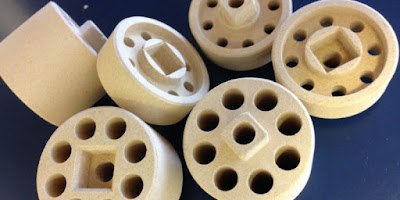Ceramic injection moulding is an advanced technology used for manufacturing high-precision elements, intended according to the client’s specification available in medium to large quantities. Moreover, it is a vital part of various industries. Ceramic elements have extensive applications and allow excellent durability, flexibility, and hardness than plastic moulding or manufactured steel components.
Ceramic injection moulding relates to the process by which custom ceramic components are formed using the injection mould method which is similar to the one used with plastics. Throughout the process, a pelletised mixture of Alumina powder and specific binders are pre-heated and then pushed under high pressure into a custom-made mould to produce components as per the customer’s specific part configuration. After the separation of a particular part from the mould, it undergoes many further processes such as sintering at high temperatures.
Ceramic injection moulding makes the use of cutting-edge tools and thoroughly devised methods to manufacture ceramic parts at clear dimensions for manufacturers in different industries, including thermal and electrical insulation, gas and oil exploration, electronics industry, water filtration, medical care, food service, aerospace, automotive, and dentistry.
Custom Ceramic Injection Moulding
Custom ceramic injection moulding makes it possible to customize a component according to your exact specification in size within a determined cost. Many experts have years of hands-on, practical experience in mould-making, moulding, processing and machining or finishing.
Materials Used in the Ceramic Injection Moulding
When it comes to choosing particular materials in ceramic injection moulding, there is a wide range of available choices on the market. Available materials have different features, including hardness, frequency, temperature resistance, and more. Here is the detail of the most trustworthy materials employed for ceramic injection moulding. Take a look:
Alumina ceramics is one of the most extensively used materials in ceramic injection moulding. Its features involve high levels of electrical insulation, stability to corrosion and temperature, and manufacturing strength.
Zirconia ceramics possibly the most durable ceramic material, is used for several purposes, including medical and dental purposes. Zirconia is extremely resistant to wear and breaking, owning an outstanding level of damage tolerance. Moreover, it is notably constant in high-pressure conditions.
Whether it is a medical tool company that requires excellent quality for high-precision implants or an electrical component company, ceramic injection moulding can hugely benefit most businesses. It will allow you to obtain custom-made mouldings of outstanding stability that satisfy all the essential industry standards. Hence, if you are thinking of using Machinable Glass Ceramics for your part specifications, it is helpful to consider an experienced team.





0 comments:
Post a Comment